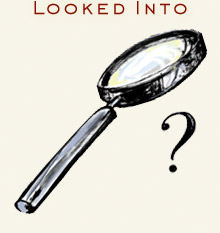Emdashes—Modern Times Between the Lines
The Basics:
About Emdashes | Email us
Ask the Librarians
Best of Emdashes: Hit Parade
A Web Comic: The Wavy Rule
Features & Columns:
Headline Shooter
On the Spot
Looked Into
Sempé Fi: Cover Art
Meditations in a Newsmergency
Filed under: Looked Into Tagged: blogs, books, newspapers, nonfiction, Scott Rosenberg, Sewell Chan, Shouts & Murmurs, technology

Michael Nielsen writes in “Is Scientific Publishing About to Be Disrupted?”, which is worth reading through to the sound advice at the end:
Important economic and media-future questions aside, this preoccupation with what a “blogger” does and doesn’t do—and can and can’t do—continues to be fascinating but frustrating to me. (This is why I’m looking forward to reading Say Everything: How Blogging Began, What It’s Becoming, and Why It Matters, by Scott Rosenberg, who, on his book’s site, answers the question “Aren’t there just too many blogs?” with a brief and hilarious “No.”) As Sewell Chan said not long ago: “The whole blogger versus journalist debate that might have existed around 2004 is dead. Over. Stale. Uninteresting. I couldn’t care less — it’s a meaningless debate to have. What’s more interesting to me is what a blog means now.”
Yes indeed, a blog means something—that’s very clear—but what about a “blogger”? If you don’t mind the self-quoting (I so rarely indulge!), I’ll repeat, Pete:
Some people explain the slow death of newspapers by saying that blogs and other online sources [1 (see note)] are news parasites, feeding off the original reporting done by the newspapers. That’s false. While it’s true that many blogs don’t do original reporting, it’s equally true that many of the top blogs do excellent original reporting…. Five years ago, most newspaper editors would have laughed at the idea that blogs might one day offer serious competition. The minicomputer companies laughed at the early personal computers. New technologies often don’t look very good in their early stages, and that means a straightup comparison of new to old is little help in recognizing impending dispruption. That’s a problem, though, because the best time to recognize disruption is in its early stages.Although much of my own reporting for Emdashes is in the somewhat less world-changing realm of bagel inquiries and Shouts & Murmurs phone number calling, I heartily agree.
Important economic and media-future questions aside, this preoccupation with what a “blogger” does and doesn’t do—and can and can’t do—continues to be fascinating but frustrating to me. (This is why I’m looking forward to reading Say Everything: How Blogging Began, What It’s Becoming, and Why It Matters, by Scott Rosenberg, who, on his book’s site, answers the question “Aren’t there just too many blogs?” with a brief and hilarious “No.”) As Sewell Chan said not long ago: “The whole blogger versus journalist debate that might have existed around 2004 is dead. Over. Stale. Uninteresting. I couldn’t care less — it’s a meaningless debate to have. What’s more interesting to me is what a blog means now.”
Yes indeed, a blog means something—that’s very clear—but what about a “blogger”? If you don’t mind the self-quoting (I so rarely indulge!), I’ll repeat, Pete:
Like “radio host” or “airplane skywriter,” the term “blogger” refers only to a medium of communication, a method of delivery. The first two descriptions might indicate something about a person’s source of income; they say a little more about his or her temperament and skills (the ability to get to a radio studio, win the slot, speak into a microphone, and work the dials, at minimum; the agility and daring to fly a plane in signifying loops).New ‘n’ related: Scott Rosenberg asks, Time to retire the term “blogger”?
But “blogger,” like “caller from Schenectady” or “chronicler of skywriting,” reveals next to nothing about that person’s training, philosophy, background, intelligence, education, politics, reporting or research skills, social life, ethics, age, poise, lucidity, conventionality, effectiveness, impulsiveness, discretion, or relationship to (or experience in) traditional media, whether “mainstream” or not. Only watching what the skywriter spells, and listening to what Schenectady has to say, will begin to make them known.
In any case, writers who pride themselves on their sensitivity to language should avoid lumping their fellows into mass categories of either variety, don’t you think?



